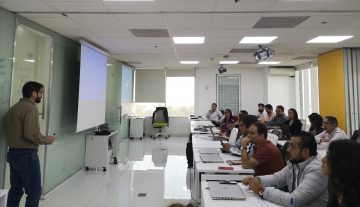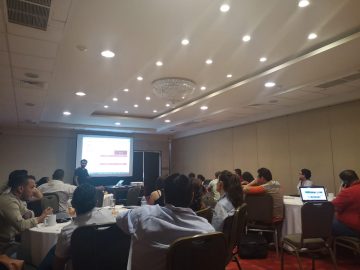A cost-benefit analysis (CBA) is relevant in the prioritization and selection of climate change measures since it allows to calculate the economic viability and positive external aspects for effective implementation, facilitating the decision-making of one action against another. To include this analysis in the policy of the different levels of government, a series of workshops were developed in order to train public servants in the use of the CBA methodology.
A cost-benefit analysis (CBA) is relevant in the prioritization and selection of climate change measures since it allows to calculate the economic viability and positive external aspects for effective implementation, facilitating the decision-making of one action against another. To include this analysis in the policy of the different levels of government, a series of workshops were developed in order to train public servants in the use of the CBA methodology.
Under this context, within the framework of the “Vertically Integrated Climate Policies” Programs (VICLIM) and “Ecosystem-based adaptation to climate change in cooperation with the private sector in Mexico” (ADAPTUR) implemented by GIZ, three theoretical and practical workshops were held regarding this methodology. In the first part of the training, attendees learned the background of the CBA, as well as the basic concepts of social cost-benefit analysis and environmental economics to perform economic evaluations for environmental projects; specifically, those that contribute to sustainable development and low emissions.

In a second practical part, the participants learned to use the CBA computer tool that was developed by GIZ, and can be consulted at www.acbgiz.org. It is designed to facilitate social cost-benefit analysis, without implying in-depth knowledge. Through this tool, attendees were able to model public investment projects and interpret the results of social profitability. This, together with the theoretical bases, will allow public servants to give recommendations on whether or not to carry out those projects and report on the costs and benefits that they imply for society.

The workshops took place on August 30 in Guadalajara, on August 21 in Puerto Vallarta, and on September 26 and 27 in Mexico City. It was attended by municipal actors from the government of Puerto Vallarta and Costa Rica, as well as from intermunicipal boards and the Metropolitan Area Development Planning and Management Institute of Guadalajara . Likewise, public servants of the Ministry of Environment and Territorial Development of Jalisco (SEMADET), the Ministry of Environment and Natural Resources (SEMARNAT), Ministry of Tourism (SECTUR), National Commission of Natural Protected Areas (CONANP), National Institute of Ecology and Climate Change (INECC), and technical advisors of GIZ participated.
Para consultar:
Taller Adaptación al Cambio Climático – Análisis Costo Beneficio Social ppt.
